Trimester 2, 2019: MPA702 Financial Interpretation Report
VerifiedAdded on 2022/10/06
|6
|873
|22
Report
AI Summary
This report, prepared for MPA702, focuses on financial interpretation and ethical considerations in accounting. Question 1 examines ethical frameworks, specifically utilitarianism and deontology, and applies them to a scenario involving a pharmaceutical company manipulating drug success rates. The analysis emphasizes the accountant's duty to disclose information under the Australian Corporations Act, highlighting the conflict of interest created by concealing crucial data. Question 2 addresses insider trading, referencing Section 1043A of the Corporations Act. It explores a scenario where family members of an employee, aware of non-public information, consider selling shares, thereby violating insider trading laws. The report underscores the prohibition on trading securities with sensitive, non-public data, and the importance of adhering to legal and ethical standards in financial reporting.
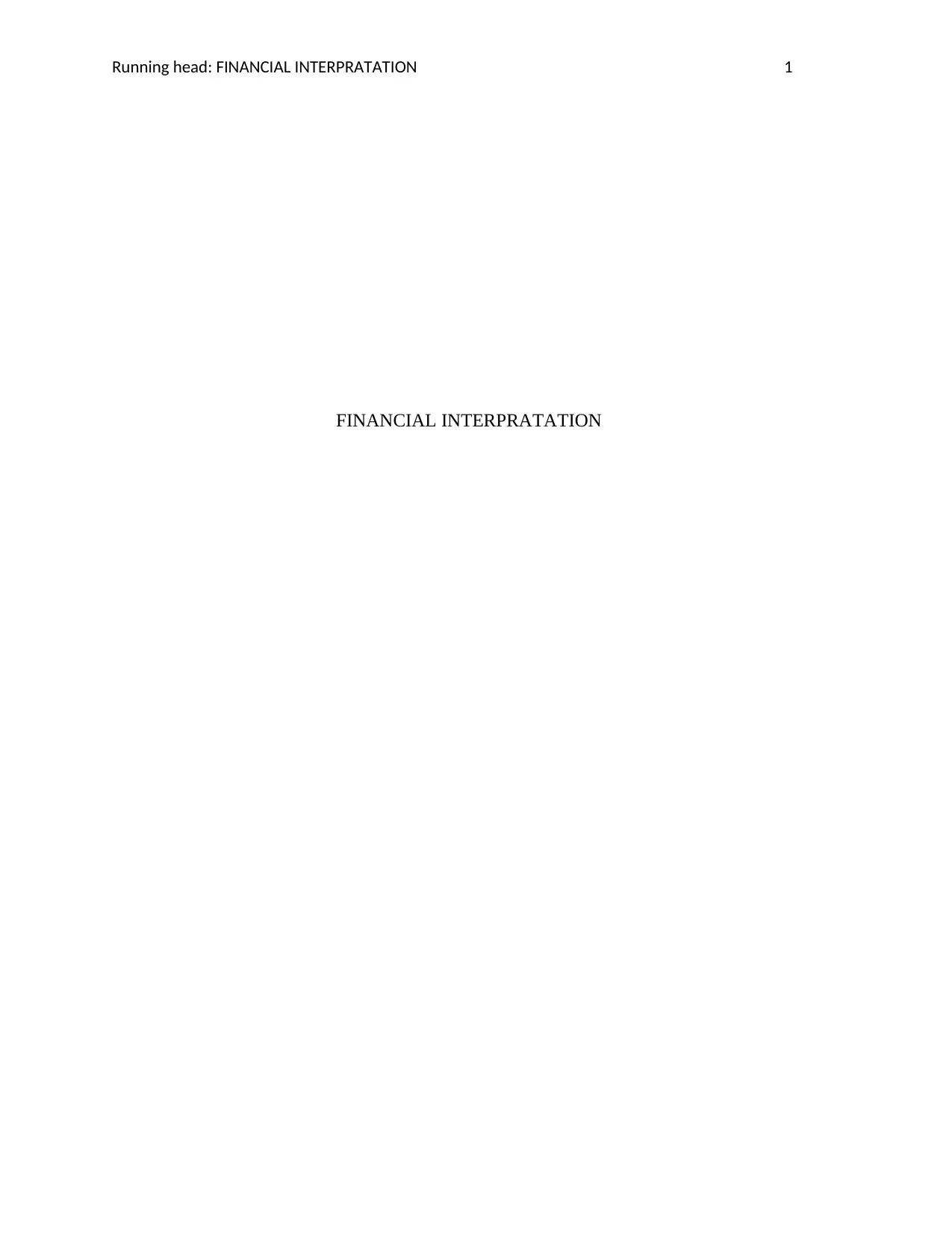
Running head: FINANCIAL INTERPRATATION 1
FINANCIAL INTERPRATATION
FINANCIAL INTERPRATATION
Paraphrase This Document
Need a fresh take? Get an instant paraphrase of this document with our AI Paraphraser
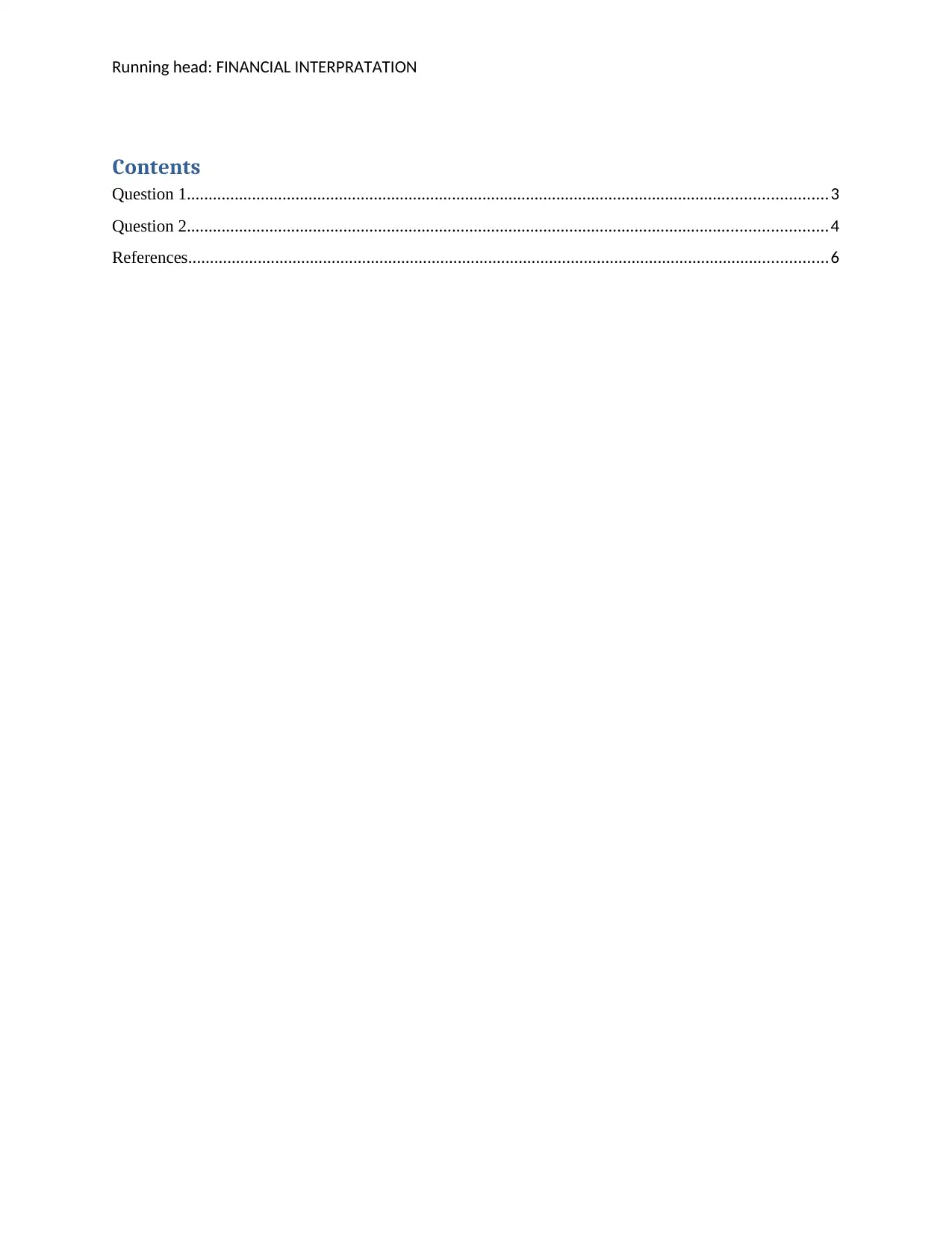
Running head: FINANCIAL INTERPRATATION
Contents
Question 1...................................................................................................................................................3
Question 2...................................................................................................................................................4
References...................................................................................................................................................6
Contents
Question 1...................................................................................................................................................3
Question 2...................................................................................................................................................4
References...................................................................................................................................................6
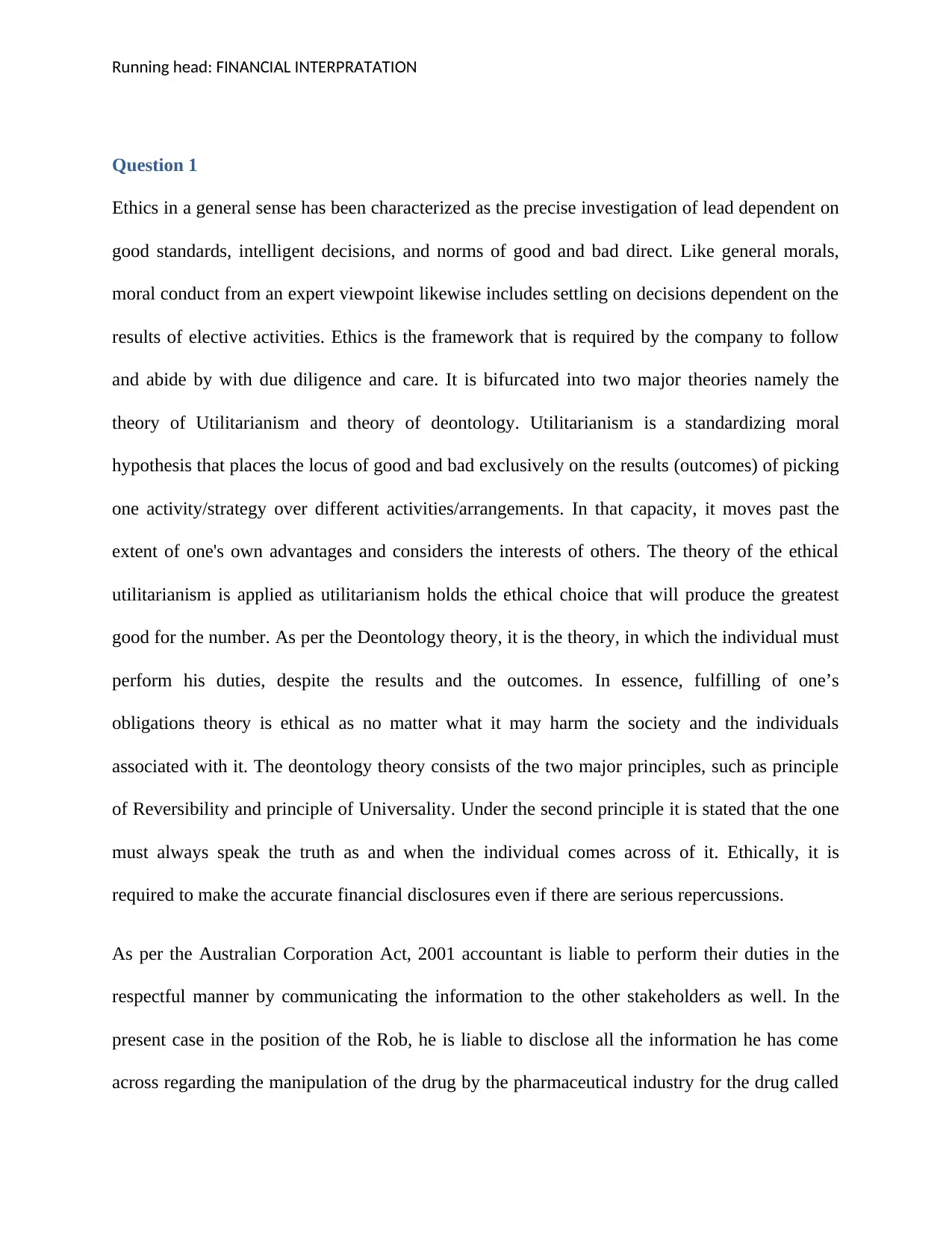
Running head: FINANCIAL INTERPRATATION
Question 1
Ethics in a general sense has been characterized as the precise investigation of lead dependent on
good standards, intelligent decisions, and norms of good and bad direct. Like general morals,
moral conduct from an expert viewpoint likewise includes settling on decisions dependent on the
results of elective activities. Ethics is the framework that is required by the company to follow
and abide by with due diligence and care. It is bifurcated into two major theories namely the
theory of Utilitarianism and theory of deontology. Utilitarianism is a standardizing moral
hypothesis that places the locus of good and bad exclusively on the results (outcomes) of picking
one activity/strategy over different activities/arrangements. In that capacity, it moves past the
extent of one's own advantages and considers the interests of others. The theory of the ethical
utilitarianism is applied as utilitarianism holds the ethical choice that will produce the greatest
good for the number. As per the Deontology theory, it is the theory, in which the individual must
perform his duties, despite the results and the outcomes. In essence, fulfilling of one’s
obligations theory is ethical as no matter what it may harm the society and the individuals
associated with it. The deontology theory consists of the two major principles, such as principle
of Reversibility and principle of Universality. Under the second principle it is stated that the one
must always speak the truth as and when the individual comes across of it. Ethically, it is
required to make the accurate financial disclosures even if there are serious repercussions.
As per the Australian Corporation Act, 2001 accountant is liable to perform their duties in the
respectful manner by communicating the information to the other stakeholders as well. In the
present case in the position of the Rob, he is liable to disclose all the information he has come
across regarding the manipulation of the drug by the pharmaceutical industry for the drug called
Question 1
Ethics in a general sense has been characterized as the precise investigation of lead dependent on
good standards, intelligent decisions, and norms of good and bad direct. Like general morals,
moral conduct from an expert viewpoint likewise includes settling on decisions dependent on the
results of elective activities. Ethics is the framework that is required by the company to follow
and abide by with due diligence and care. It is bifurcated into two major theories namely the
theory of Utilitarianism and theory of deontology. Utilitarianism is a standardizing moral
hypothesis that places the locus of good and bad exclusively on the results (outcomes) of picking
one activity/strategy over different activities/arrangements. In that capacity, it moves past the
extent of one's own advantages and considers the interests of others. The theory of the ethical
utilitarianism is applied as utilitarianism holds the ethical choice that will produce the greatest
good for the number. As per the Deontology theory, it is the theory, in which the individual must
perform his duties, despite the results and the outcomes. In essence, fulfilling of one’s
obligations theory is ethical as no matter what it may harm the society and the individuals
associated with it. The deontology theory consists of the two major principles, such as principle
of Reversibility and principle of Universality. Under the second principle it is stated that the one
must always speak the truth as and when the individual comes across of it. Ethically, it is
required to make the accurate financial disclosures even if there are serious repercussions.
As per the Australian Corporation Act, 2001 accountant is liable to perform their duties in the
respectful manner by communicating the information to the other stakeholders as well. In the
present case in the position of the Rob, he is liable to disclose all the information he has come
across regarding the manipulation of the drug by the pharmaceutical industry for the drug called
⊘ This is a preview!⊘
Do you want full access?
Subscribe today to unlock all pages.

Trusted by 1+ million students worldwide
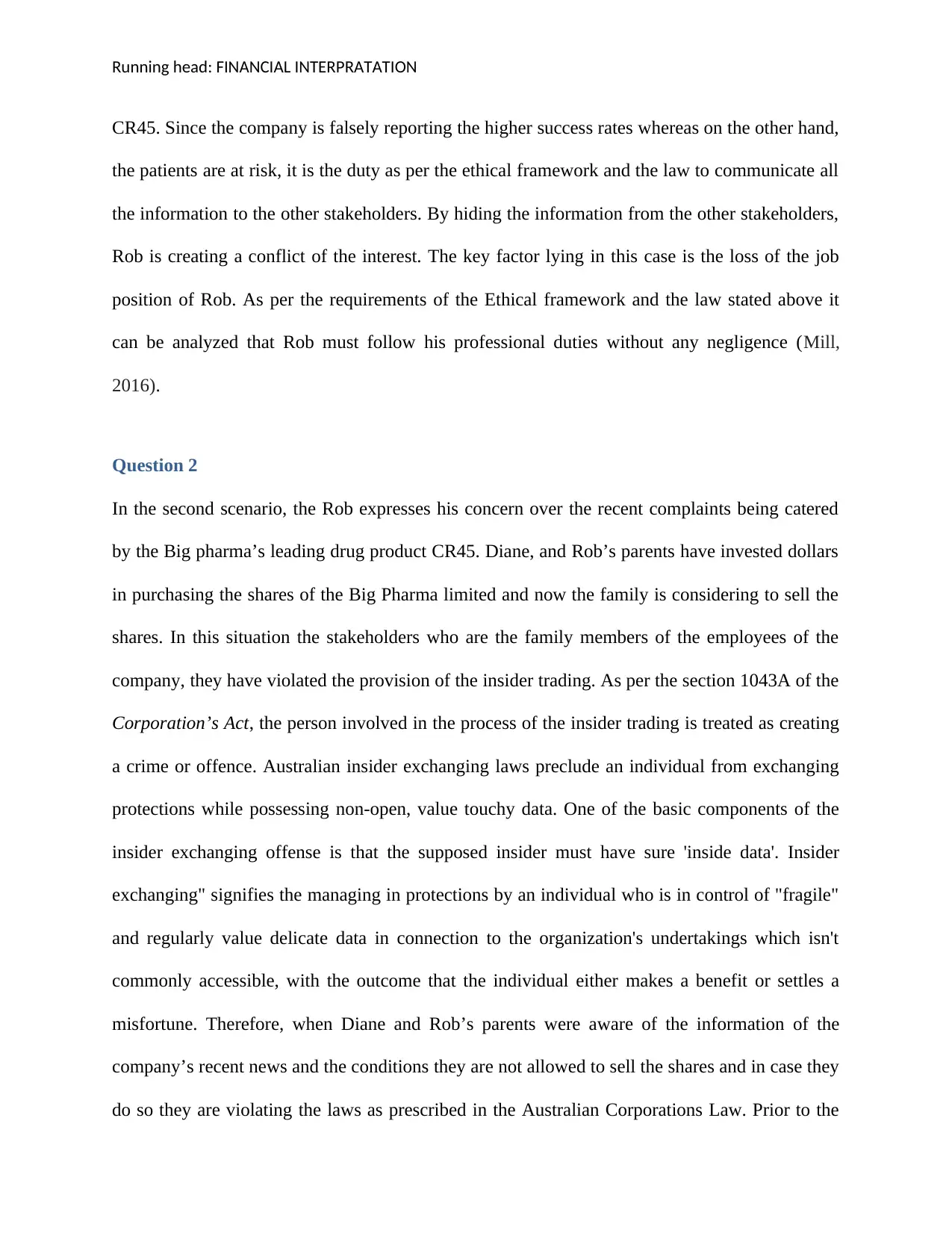
Running head: FINANCIAL INTERPRATATION
CR45. Since the company is falsely reporting the higher success rates whereas on the other hand,
the patients are at risk, it is the duty as per the ethical framework and the law to communicate all
the information to the other stakeholders. By hiding the information from the other stakeholders,
Rob is creating a conflict of the interest. The key factor lying in this case is the loss of the job
position of Rob. As per the requirements of the Ethical framework and the law stated above it
can be analyzed that Rob must follow his professional duties without any negligence (Mill,
2016).
Question 2
In the second scenario, the Rob expresses his concern over the recent complaints being catered
by the Big pharma’s leading drug product CR45. Diane, and Rob’s parents have invested dollars
in purchasing the shares of the Big Pharma limited and now the family is considering to sell the
shares. In this situation the stakeholders who are the family members of the employees of the
company, they have violated the provision of the insider trading. As per the section 1043A of the
Corporation’s Act, the person involved in the process of the insider trading is treated as creating
a crime or offence. Australian insider exchanging laws preclude an individual from exchanging
protections while possessing non-open, value touchy data. One of the basic components of the
insider exchanging offense is that the supposed insider must have sure 'inside data'. Insider
exchanging" signifies the managing in protections by an individual who is in control of "fragile"
and regularly value delicate data in connection to the organization's undertakings which isn't
commonly accessible, with the outcome that the individual either makes a benefit or settles a
misfortune. Therefore, when Diane and Rob’s parents were aware of the information of the
company’s recent news and the conditions they are not allowed to sell the shares and in case they
do so they are violating the laws as prescribed in the Australian Corporations Law. Prior to the
CR45. Since the company is falsely reporting the higher success rates whereas on the other hand,
the patients are at risk, it is the duty as per the ethical framework and the law to communicate all
the information to the other stakeholders. By hiding the information from the other stakeholders,
Rob is creating a conflict of the interest. The key factor lying in this case is the loss of the job
position of Rob. As per the requirements of the Ethical framework and the law stated above it
can be analyzed that Rob must follow his professional duties without any negligence (Mill,
2016).
Question 2
In the second scenario, the Rob expresses his concern over the recent complaints being catered
by the Big pharma’s leading drug product CR45. Diane, and Rob’s parents have invested dollars
in purchasing the shares of the Big Pharma limited and now the family is considering to sell the
shares. In this situation the stakeholders who are the family members of the employees of the
company, they have violated the provision of the insider trading. As per the section 1043A of the
Corporation’s Act, the person involved in the process of the insider trading is treated as creating
a crime or offence. Australian insider exchanging laws preclude an individual from exchanging
protections while possessing non-open, value touchy data. One of the basic components of the
insider exchanging offense is that the supposed insider must have sure 'inside data'. Insider
exchanging" signifies the managing in protections by an individual who is in control of "fragile"
and regularly value delicate data in connection to the organization's undertakings which isn't
commonly accessible, with the outcome that the individual either makes a benefit or settles a
misfortune. Therefore, when Diane and Rob’s parents were aware of the information of the
company’s recent news and the conditions they are not allowed to sell the shares and in case they
do so they are violating the laws as prescribed in the Australian Corporations Law. Prior to the
Paraphrase This Document
Need a fresh take? Get an instant paraphrase of this document with our AI Paraphraser
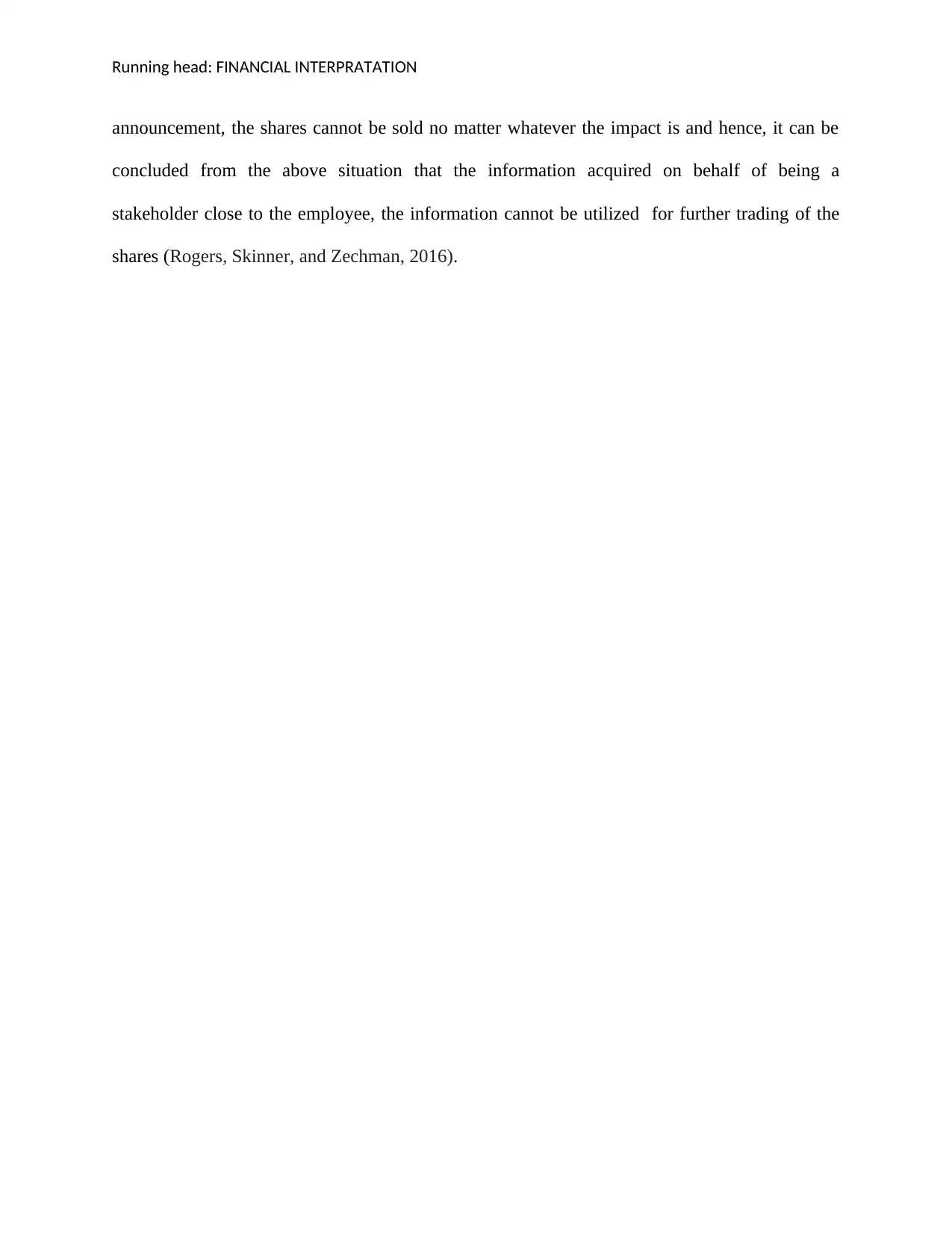
Running head: FINANCIAL INTERPRATATION
announcement, the shares cannot be sold no matter whatever the impact is and hence, it can be
concluded from the above situation that the information acquired on behalf of being a
stakeholder close to the employee, the information cannot be utilized for further trading of the
shares (Rogers, Skinner, and Zechman, 2016).
announcement, the shares cannot be sold no matter whatever the impact is and hence, it can be
concluded from the above situation that the information acquired on behalf of being a
stakeholder close to the employee, the information cannot be utilized for further trading of the
shares (Rogers, Skinner, and Zechman, 2016).
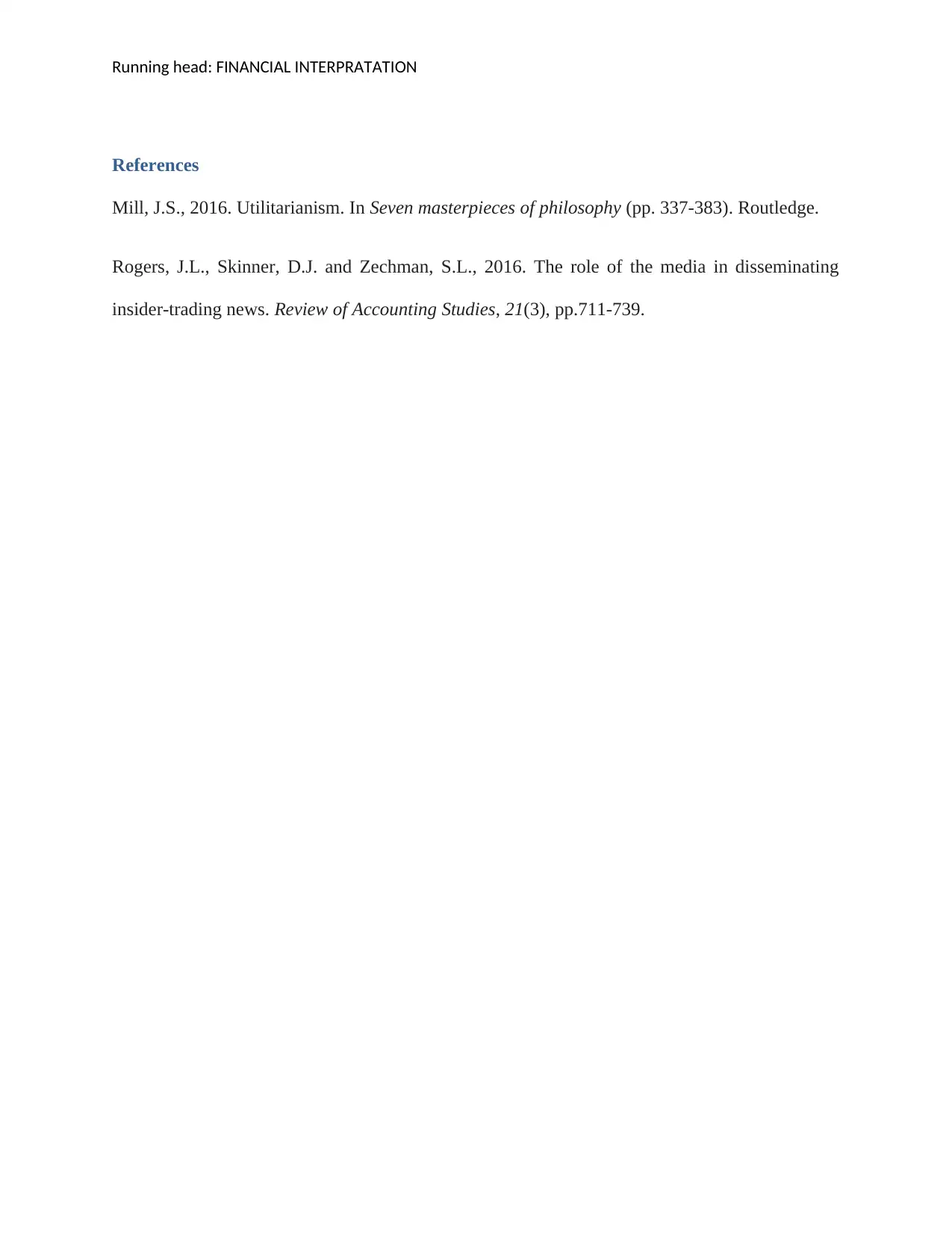
Running head: FINANCIAL INTERPRATATION
References
Mill, J.S., 2016. Utilitarianism. In Seven masterpieces of philosophy (pp. 337-383). Routledge.
Rogers, J.L., Skinner, D.J. and Zechman, S.L., 2016. The role of the media in disseminating
insider-trading news. Review of Accounting Studies, 21(3), pp.711-739.
References
Mill, J.S., 2016. Utilitarianism. In Seven masterpieces of philosophy (pp. 337-383). Routledge.
Rogers, J.L., Skinner, D.J. and Zechman, S.L., 2016. The role of the media in disseminating
insider-trading news. Review of Accounting Studies, 21(3), pp.711-739.
⊘ This is a preview!⊘
Do you want full access?
Subscribe today to unlock all pages.

Trusted by 1+ million students worldwide
1 out of 6
Related Documents
Your All-in-One AI-Powered Toolkit for Academic Success.
+13062052269
info@desklib.com
Available 24*7 on WhatsApp / Email
![[object Object]](/_next/static/media/star-bottom.7253800d.svg)
Unlock your academic potential
Copyright © 2020–2026 A2Z Services. All Rights Reserved. Developed and managed by ZUCOL.





